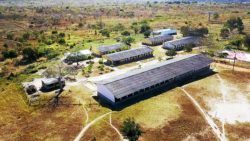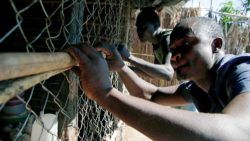For several years the Aga Khan Foundation, in partnership with Cargill, has helped to grow the Agrarian Institute of Bilibiza and its career development center, a vital hub for growing farming expertise in northern Mozambique.

An aerial view of the poultry enterprises in Bilibiza.
The project equips the Institute’s graduates with in-demand job skills and strengthens overall business capacity in northern Mozambique. Graduates in agriculture and forestry leave with skills that they can use in the job market around them. Furthermore, over the last year, the Institute has also placed more than 200 students in internships with private sector companies in the region during key periods within the agricultural season. The experience gives students first hand, pre-professional experience and equips them with the skills for future employability. Through opportunities like this and improved facilities and faculty, the Institute is making a difference. Enrollment has nearly tripled, with 308 students signing up.
This year, to take the business skills development to a new level, the staff created incubators for small-farm businesses.
Poultry Enterprises Take Off
Upon graduating, students had the option to participate in business incubators. Incubators are a space that equips new businesses with tools, mentorships, and skill-building opportunities for them to grow and develop. The incubators provide a hands-on opportunity for the graduates develop their business skills and earn their own independent income, as well as generate resources for the institute. The success of the first cohort of graduates’ incubators will inspire more graduates to take part in these sorts of initiatives and increase the prospects of entrepreneurship and self-employment in the region.
The incubators have shown good results. Four poultry enterprises finished their first cycle, breeding broiler chickens with very good outcomes. The farmers experienced no chicken mortality and the chickens’ average weight ranged up to 3 pounds each, slightly more than the average local chicken. Now all four enterprises are marketing and selling in the local market. The chicken pens they use allow them to grow their operations gradually.

Two graduate farmers ensure that their chicken coop is properly secured.
By the end of the first week, the entrepreneurs in Macomia district and Pemba had already sold more than half of their production; the entrepreneurs in Ancuabe had sold nearly all of it. These results are exceptional; particularly considering this was the entrepreneurs’ first business experience.
Key factors in their success include the entrepreneurs’ enthusiasm and commitment; their confidence in themselves and good relationships among the enterprise members; good quality products; and positive market reception.
In their marketing training, these incubators received suggestions on establishing points of sale along the main roads and markets. They got guidance on negotiating contacts with potential customers for regular and bulk sales even before they concluded the second cycle of poultry breeding. This helped the business owners to sell faster and respond to market pricing.
This is just one example of the changes at Bilibiza in training the country’s farming and business leaders.
Bringing Skills to the Community
Another change is the level of engagement with the community. Bilibiza is a hub of learning and culture, as well as an avenue for support of vulnerable members of the local community where the main livelihood is agricultural development
Gino Basilio, the Institute’s director, says that before, the average student would teach techniques to four local families. “Now we have one student teaching 10 families at a time. Not only this, but we also organize agricultural fairs where the community can come sell their products. We also host short courses for community members.”
The energy of the enterprise incubator is catching with other students too. Clavet Mateus, one current student, says, “I came here because I wanted to take a professional course and learn and take this knowledge to my community.” Now, he sees opportunities with other enterprise funding. “The local government has a fund and one can apply to it,” he says. “After I’m done with school, I’m thinking about coming up with a project proposal and applying for that fund. If I get the money, I will buy chickens…”
Creating a Sustainable Institution
“Bilibiza in five years will be completely different in terms of development,” says Basilio, the director. “We now have students coming from all over Mozambique. We now have tractors and other farming equipment that we didn’t have when I was in school.” He adds, “This school will be self-sustainable.”
For more about this program, click here.